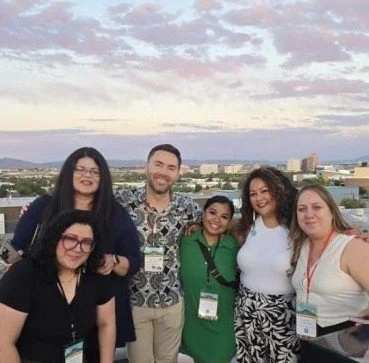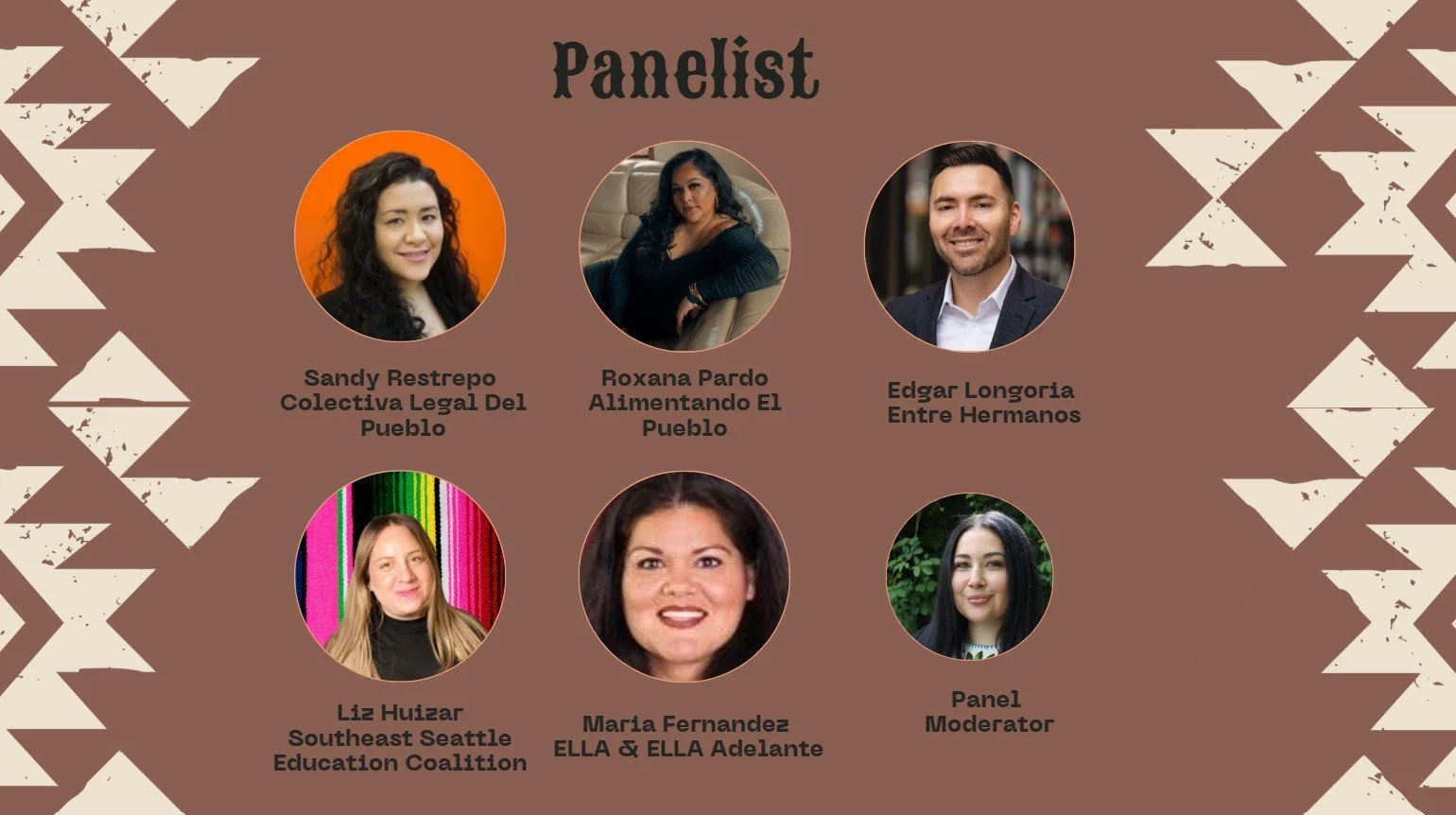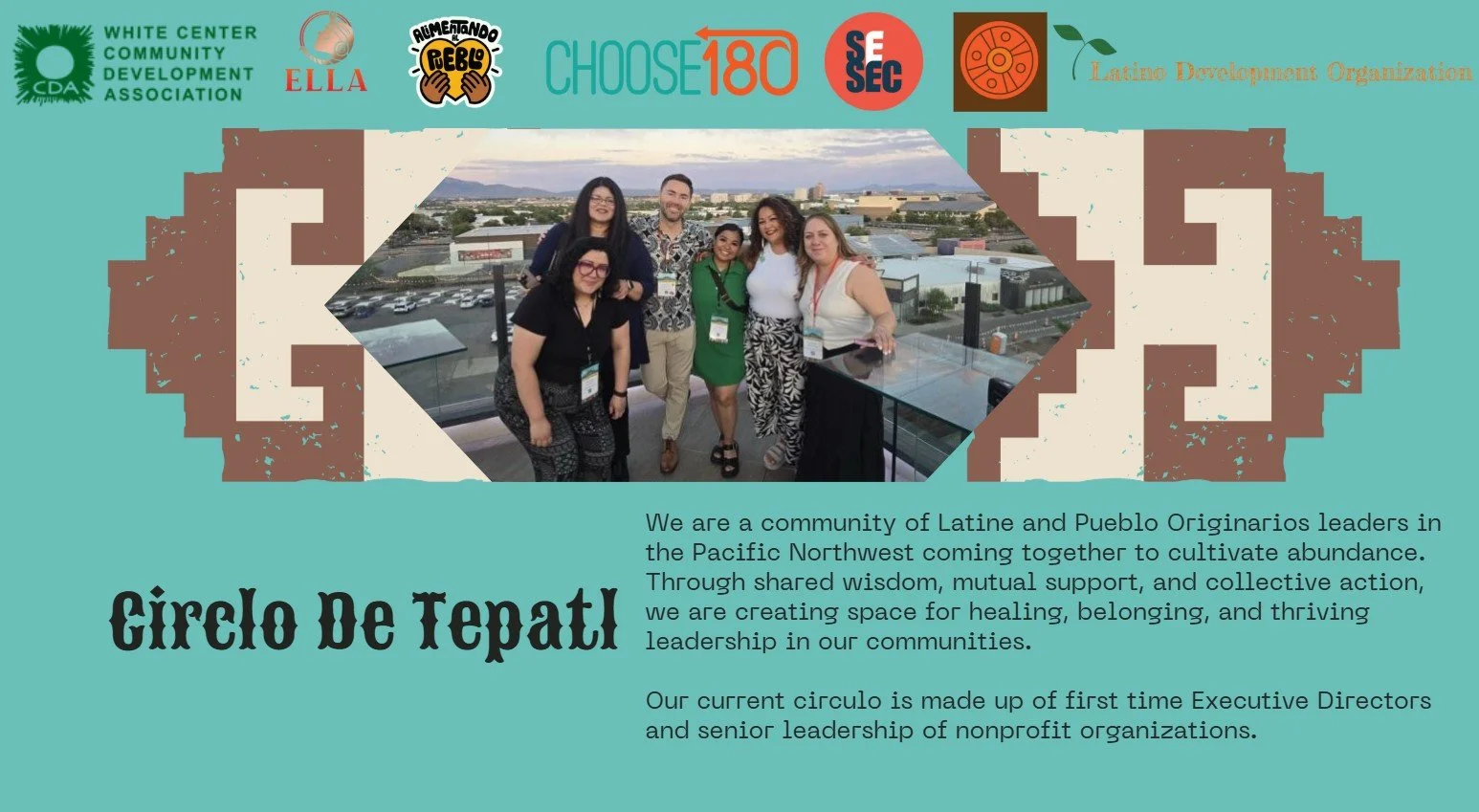“There’s A Lot of Magic In That”: Four Takeaways from the Hispanics In Philanthropy/Native Americans in Philanthropy Conference
At a recent webinar, local nonprofit leaders share what they learned
The cohort at the HIP-NAP Conference in Albuquerque: Left-right, Sandy Restrepo, Maria Fernandez, Edgar Longoria, Roxana Pardo Garcia, and Liz Huizar with Sunnyside Councilmember Vicky Fausto in the center, in green.
“Scarcity is manufactured; it’s created so that people do not ask for what they deserve.” This is one of the takeaways Roxana Pardo Garcia shared at the Aug. 25 webinar, “Voces Del Tēpatl: Carrying Conference Lessons into Community Action.”
Roxana was one of five local leaders from nonprofits who together had attended a national conference, Hispanics in Philanthropy/Native Americans in Philanthropy (HIP-NAP), in Albuquerque in June. At the webinar, these leaders shared their insights from that conference. They had attended as a cohort with support from Communities of Opportunity’s Learning Community strategy.
Graphics in English and Spanish, created to promote the webinar, capture the landscapes of the Southwest and Pacific Northwest.
The four leaders who spoke at the webinar are:
· Maria Fernandez, ELLA and ELLA Adelante
· Roxana Pardo Garcia, Alimentando al Pueblo
· Liz Huizar, Southeast Seattle Education Coalition
· Edgar Longoria, Entre Hermanos
The fifth member of the cohort, Sandy Restrepo of Colectiva Legal Del Pueblo, wasn’t able to attend the webinar -- she was helping a client in court.
Julissa Sanchez of CHOOSE 180 moderated the discussion.
A slide from the webinar, spotlighting the speakers.
New Organization for Latine and Indigenous Leaders Is Forming
The webinar started with an exciting announcement: The formation of Circlo De Tapatl, a new organization for Latine and Pueblo Originarios leaders in the Pacific Northwest. They’re coming together to cultivate abundance and create space for healing, belonging, and thriving leadership.
The slide announcing the formation of Circlo De Tepatl.
Roxana explained that she had been talking with other leaders for several months about the need to create space for Latine and other leaders to learn together and be in relationship with each other. “A lot of us are not receiving any kind of mentorship in the nonprofit space that we need to be able to lead,” she said. “We found it was really important to be in relationship with one another.”
So, they formed this group, Circlo De Tapatl, which means Medicine People or Healers. Roxana said it’s not a conventional name, but it’s one that is reflective of the intention of their work.
The group is intended to facilitate healing, be accountable to each individual’s journey, and be accountable to our collective journey, Roxana explained. She said it came about partly because folks have shared heavy critiques of other spaces that are dominated by colonialism, racism, and classism, whereas this space will share ancestral knowledge, wisdom, and understanding.
The eight organizations currently participating in Circlo are Alimentando al Pueblo, Colectiva Legal Del Pueblo, CHOOSE 180, ELLA, Entre Hermanos, Latino Development Organization, Southeast Seattle Education Coalition, and White Center Community Development Association. Roxana explained that membership isn’t open to others yet. First, the core organizations will solidify the leadership structure at an upcoming retreat. They will onboard new membership after that. The intent is that it will eventually be a multi-state organization.
The speakers then shared some honest takeaways from the conference about philanthropy – especially what needs to change. Here are a few brief highlights.
Conference Takeaway #1: Frame Abundance, Not Scarcity
Roxana had talked about abundance as one of the reasons for forming Circlo. And abundance was one of the striking themes at the conference for both her and Edgar.
First, Roxana said, there’s the idea or illusion that scarcity exists. Capitalism creates scarcity, she remarked; “scarcity is not real. We are actually an incredibly wealthy region.” It’s not just monetary; it’s also an abundance of ideas, creativity and imagination of the people who live here. “Scarcity is manufactured; it’s created to make sure that people do not ask for what they deserve,” she said.
Edgar agreed, “How much money is out there, it’s mind blowing.”
Roxana urged philanthropy and funders to re-orient out of a scarcity framework into abundance.
Conference Takeaway #2: Organizations Need Multi-Year Investments
Nonprofits, especially Latine-led, repeatedly get asked to do rapid-response front-line work to serve the people most under attack – immigrants, people living in poverty, single moms, and so on. “While rapid response dollars are great, and meeting the moment is great, we also deserve multi-year investments in our work,” Roxana said. “It’s not either/or, it’s both/and. How do we fund urgent needs and also fund long-term organizing, long-term movement building and really fund the organizations that are on the ground doing the work.”
Edgar agreed that “we need to be funding for the long term. It helps us thrive, hold on to staff with expertise, and develop our organizations.” He asked, where are some of the big Latino organizations in this conversation? “If they’re working for democracy, why are they not engaging nonprofit organizations across the country even further?” He noted that conversely, conservative funders will fund for the long term – not just 3-5 years but more like 20-30 years.
Maria agreed and said that in this current climate “there is a lot of talk about saving democracy. I have to challenge that. I doubt we ever had true democracy to begin with. All our organizations represented today, we all touch on those issues of democracy in our own respective areas where we operate, trying to get some semblance of actual democracy within our own localities. When we talk about the trends with philanthropy and talking about the root causes of what’s ailing our communities, it’s really difficult to accept that philanthropy does do work on trends. All of these issues are a forever issue. It’s going to take generations to deal with them.”
She said we need to be looking 10-20 years down the road. But if funding is only in one-year increments, it makes it incredibly difficult to have any stability or continuity, much less expand. “I don’t know if philanthropy even understands how difficult it is to deal with root causes, systemic issues,” she noted.
Conference Takeaway #3: Philanthropy Trends Include Roadblocks to Funding
Edgar said the second thing that struck him, after the realization that there are billions of dollars in endowments at these foundations, is “the roadblocks.” He said he and his colleagues at the conference went out ready to meet funders, get to know where they work and what they care about, “and the answers we started receiving were, you need to talk to my area leader, they’re the ones who are the decision makers at my organization.’ We heard a lot of ‘I don’t have power or money, even though I work for this huge well-known foundation.’” Another barrier was funders saying they have a 5-10 year plan, so they can’t do rapid response. Or, “We only fund a certain cause, or certain region, or orgs under a certain budget.”
Maria said smaller nonprofits are competing with longtime organizations that are part of the “nonprofit industrial complex – they are money machines. The other trend in philanthropy is that those organizations – what I call the Ivory Tower organizations in the nonprofit sector because they’re money machines – that’s philanthropy’s go-to. ‘Let’s give to these long-lasting organizations that have been around forever,’ yet it’s us small nonprofit organizations that are boots on the ground, really trying to change systems.”
Edgar said there’s risk involved if a nonprofit organization appears to be doing “too well.” “You run the risk of being deprioritized by funders. We have to be careful on how many wins we put out there for our community. That’s not how I like to operate. I like to celebrate our wins with our community.”
He said he feels there is a lack of courage among many philanthropists and that they almost follow each other, and there is a lack of naming what needs to be named.
Edgar and Maria also mentioned the fact that many funders have invitation-only grant application processes. “It’s so difficult to find a person within a foundation to talk to about your organization and the amazing work you do,” Maria said. “That’s making it all the more critical for groups like this, groups of EDs coming together to share information and resources.”
Maria said the conference was “incredibly insightful” in identifying these trends.
Conference Takeaway #4: Showing Up Is Powerful
For Liz, one of the major takeaways was “fundamentally, show up. Make time for conferences. Make time for learning outside of this work. So often in this work, everything feels urgent. The reality is, there are very real pressing issues – and there is also time to enhance your creativity, to have some dialogue with leaders who can expand the way you look at something.”
She also pointed out the value of just being together -- the connections and conversations that happen outside the keynotes and workshops. “Making the most of the experience is Number One. Just making the time. Do not just put your head down and do the work... In reality you become so much more powerful when you move forward with collaboration.
“My advice for fellow leaders is when you just put your head down and don’t look up, you miss out on a lot of beautiful stuff. When you do go to conferences, don’t just make it about the work. Make it about the unstructured time, because there’s a lot of magic in that.”
Video Available On Request
For more takeaways, including tips on making the most of a conference experience, watch the full 1-hour workshop video. You can request the link below. Please include your full name and email, and subject line “HIP-NAP Video,” in your message.




